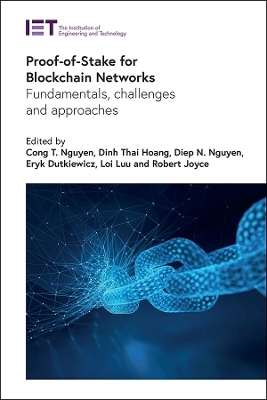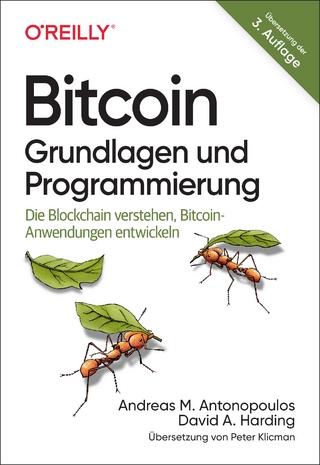
Proof-of-Stake for Blockchain Networks
Institution of Engineering and Technology (Verlag)
978-1-83953-828-5 (ISBN)
A consensus mechanism is the core component of a blockchain network, which ensures that every participant agrees on the state of the network in trustless environments. Until now, current blockchain networks have been using the proof-of-work (PoW) consensus mechanism, which has serious limitations such as huge energy consumption, low transaction processing capabilities, and centralization and scalability issues. To overcome these problems, a new consensus mechanism entitled proof-of-stake (PoS) has been developed. PoS has many advantages, including negligible energy consumption and very low consensus delay. Ethereum (the largest decentralized global software platform to create secured digital technology powered by blockchain technology and the blockchain of choice globally for all developers and enterprises) has just switched from PoW to PoS. As a result, this mechanism is expected to become a cutting-edge technology for future blockchain networks.
This book provides a comprehensive discussion of the PoS consensus mechanism for blockchain networks. Starting with an overview of blockchain technology and consensus mechanisms, including basic concepts and network architecture, the book provides a review of the PoS consensus mechanism, including PoS consensus security and PoS performance and scalability issues.
Proof-of-Stake for Blockchain Networks: Fundamentals, challenges and approaches is a valuable resource for researchers, engineers, and postgraduate students who are interested in advanced PoS consensus mechanisms, as well as developers and entrepreneurs who are interested in developing applications using the PoS consensus mechanism.
Cong T. Nguyen is a researcher and lecturer at the Institute of Fundamental and Applied Sciences and the Faculty of Information Technology, Duy Tan University, Vietnam. His research interests include blockchain technology, game theory, optimization, and operational research. He received his BS degree from Frankfurt University of Applied Sciences, Germany, MS degree from Technical University Berlin, Germany, and PhD degree from the University of Technology Sydney (UTS), Australia. Dinh Thai Hoang is a faculty member of the School of Electrical and Data Engineering at the University of Technology Sydney, Australia. His research interests include emerging wireless communications and networking topics, especially machine learning applications in networking, edge computing, and cybersecurity. He has received several awards, including ARC DECRA, IEEE TCSC Award, and IEEE TCI Rising Star Award. He is an editor of IEEE TWC, IEEE TMC, IEEE TCCN, IEEE TVT, and IEEE COMST. Diep N. Nguyen is the Director of the Agile Communications and Computing Group, and the Director of Transnational Education, University of Technology Sydney (UTS), Australia. His research interests include mobile computing, computer networking, and machine-learning applications, with emphasis on systems' performance and security/privacy. He is a senior member of the IEEE, serving on Editorial Boards of the IEEE Transactions on Mobile Computing, IEEE Communications Surveys & Tutorials, and IEEE Open Journal of the Communications Society. Eryk Dutkiewicz is the head of the School of Electrical and Data Engineering at the University of Technology Sydney, Australia. He has a joint professor appointment at Hokkaido University in Japan. He is also co-director of the UTS-VNU Joint Research Centres in Hanoi and in Ho Chi Minh City, Vietnam. He is a co-author of over 400 publications and 19 patent filings. His current research interests include 5G/6G communications and IoT systems and networks. Loi Luu is founder of Caliber Ventures, a venture studio that helps build new blockchain startups with talented founders around the world. He previously founded Kyber Network, one of the earliest and popular on-chain decentralised trading protocols for cryptocurrencies, in 2017 and still serves as chairman of the board. He was selected in the Forbes 30 under 30 list for Asia, and Top 10 Innovators under 35 for Asia Pacific by MIT Technology Reviews. He earned his PhD in Computer Science from the National University of Singapore, where he worked to improve base technical layers, namely decentralisation, scalability and security for the public blockchain infrastructure. Robert Joyce is the Head of Customer Strategy and Innovation for nbn Australia. He has 25+ years in telecommunications working for operators and vendors around the globe. Prior to joining nbn, he was Chief Technology Officer for Nokia in Australia and New Zealand, and, prior to that, Head of Radio Access Technologies for Qatar's Ooredoo Group where he oversaw the launch of the world's first 5G network in May 2018. He has published numerous academic papers on mobile communications and holds a PhD in "Self-Organising Heterogeneous Networks" from the University of Leeds, UK.
Chapter 1: Blockchain fundamental
Chapter 2: Consensus mechanisms
Chapter 3: Basic Proof-of-Stake consensus mechanisms
Chapter 4: Blockchain-based content caching toward 6G networks
Chapter 5: PoS-based blockchain-assisted UAV networks
Chapter 6: Leveraging Proof-of-Stake to mitigate frauds in mobile roaming management
Chapter 7: Trading and wealth evolution in the Proof of Stake protocol
Chapter 8: Proof-of-Stake blockchain security against quantum computing
Chapter 9: Summarizing Proof-of-Stake mechanisms and their practical deployments: applications, attacks, solutions, and future directions
| Erscheinungsdatum | 03.05.2024 |
|---|---|
| Reihe/Serie | Security |
| Verlagsort | Stevenage |
| Sprache | englisch |
| Maße | 156 x 234 mm |
| Themenwelt | Mathematik / Informatik ► Informatik ► Datenbanken |
| Informatik ► Netzwerke ► Sicherheit / Firewall | |
| ISBN-10 | 1-83953-828-7 / 1839538287 |
| ISBN-13 | 978-1-83953-828-5 / 9781839538285 |
| Zustand | Neuware |
| Informationen gemäß Produktsicherheitsverordnung (GPSR) | |
| Haben Sie eine Frage zum Produkt? |
aus dem Bereich


